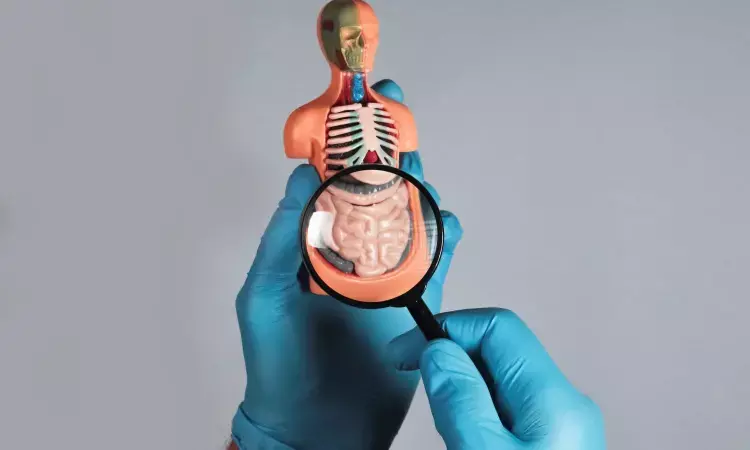- Home
- Medical news & Guidelines
- Anesthesiology
- Cardiology and CTVS
- Critical Care
- Dentistry
- Dermatology
- Diabetes and Endocrinology
- ENT
- Gastroenterology
- Medicine
- Nephrology
- Neurology
- Obstretics-Gynaecology
- Oncology
- Ophthalmology
- Orthopaedics
- Pediatrics-Neonatology
- Psychiatry
- Pulmonology
- Radiology
- Surgery
- Urology
- Laboratory Medicine
- Diet
- Nursing
- Paramedical
- Physiotherapy
- Health news
- Fact Check
- Bone Health Fact Check
- Brain Health Fact Check
- Cancer Related Fact Check
- Child Care Fact Check
- Dental and oral health fact check
- Diabetes and metabolic health fact check
- Diet and Nutrition Fact Check
- Eye and ENT Care Fact Check
- Fitness fact check
- Gut health fact check
- Heart health fact check
- Kidney health fact check
- Medical education fact check
- Men's health fact check
- Respiratory fact check
- Skin and hair care fact check
- Vaccine and Immunization fact check
- Women's health fact check
- AYUSH
- State News
- Andaman and Nicobar Islands
- Andhra Pradesh
- Arunachal Pradesh
- Assam
- Bihar
- Chandigarh
- Chattisgarh
- Dadra and Nagar Haveli
- Daman and Diu
- Delhi
- Goa
- Gujarat
- Haryana
- Himachal Pradesh
- Jammu & Kashmir
- Jharkhand
- Karnataka
- Kerala
- Ladakh
- Lakshadweep
- Madhya Pradesh
- Maharashtra
- Manipur
- Meghalaya
- Mizoram
- Nagaland
- Odisha
- Puducherry
- Punjab
- Rajasthan
- Sikkim
- Tamil Nadu
- Telangana
- Tripura
- Uttar Pradesh
- Uttrakhand
- West Bengal
- Medical Education
- Industry
Selenium and zinc deficiencies linked to adverse clinical outcomes in IBD patients on biologic therapy

Inflammatory bowel disease (IBD) patients have nutritional deficiency. This is attributed to a range of disease- and patient-related factors. According to the latest research, low micronutrients increase disease severity in patients.
A recent study has reported the prevalence of micronutrient deficiencies in the blood of a large group of adults with IBD who were being treated with biologic therapies. The study then explored the relationship between these deficiencies and adverse disease outcomes within 12 months of follow-up. The results showed that certain micronutrient deficiencies were common, with the most common deficiencies in plasma in vitamin C, folate, zinc, selenium, and ferritin. They also found that trace element deficiency of zinc and selenium was also related to adverse disease outcomes, including an induction course with steroid use and surgery. These effects persisted even after adjusting for potential confounders, indicating their independent impact on clinical outcomes. The study "Micronutrient Status and Prediction of Disease Outcome in Adults With Inflammatory Bowel Disease Receiving Biologic Therapy" is led by Emily Brownson and is published in Inflammatory Bowel Diseases.
In IBD patients, Micronutrient deficiencies are common, but there is a scarcity of data relating deficiency to the disease outcomes. Investigating further, researchers assessed the micronutrient status of adults with IBD on treatment with biologic therapies and explored predictive relationships with disease outcomes.
The team explained the study method: "We included Seventeen micronutrients (blood) in 216 adults who had IBD and were on biologic therapy. Nearly 58 % had Crohn's disease (CD), and 70 % received infliximab treatment.
These patients were followed for 12 months. We recorded the onset of adverse clinical outcomes like a requirement for treatment with corticosteroids, hospitalization, or surgical intervention and their relation to micronutrient status.
The key results of the study are:
- The common deficiencies were for vitamin C, ferritin, folate and zinc, constituting 16.5 %, 14.3 %, 14 % and 12.9 % in 35, 27, 24 and 27 patients, respectively.
- During follow-up, 10% of the 216 patients developed one or more adverse clinical outcomes.
- Patients with CD and zinc deficiency required surgery or corticosteroid treatment.
- Those with ulcerative colitis and selenium deficiency had a clinical flare of the disease. This was not recorded in patients with CD.
- Even after adjustment for confounders, the relationship with selenium remained significant.
We recorded a new finding in our study, they said. Low selenium increased disease severity in ulcerative colitis patients, while those with low zinc had complications of Crohn's disease.
Further investigations are warranted if this is a cause or consequence of the dysbiosis due to active IBD.
The study justified the routine testing of micronutrients in these patients.
Further reading:
https://academic.oup.com/ibdjournal/advance-article/doi/10.1093/ibd/izad174/7249102
BDS, MDS in Periodontics and Implantology
Dr. Aditi Yadav is a BDS, MDS in Periodontics and Implantology. She has a clinical experience of 5 years as a laser dental surgeon. She also has a Diploma in clinical research and pharmacovigilance and is a Certified data scientist. She is currently working as a content developer in e-health services. Dr. Yadav has a keen interest in Medical Journalism and is actively involved in Medical Research writing.
Dr Kamal Kant Kohli-MBBS, DTCD- a chest specialist with more than 30 years of practice and a flair for writing clinical articles, Dr Kamal Kant Kohli joined Medical Dialogues as a Chief Editor of Medical News. Besides writing articles, as an editor, he proofreads and verifies all the medical content published on Medical Dialogues including those coming from journals, studies,medical conferences,guidelines etc. Email: drkohli@medicaldialogues.in. Contact no. 011-43720751


